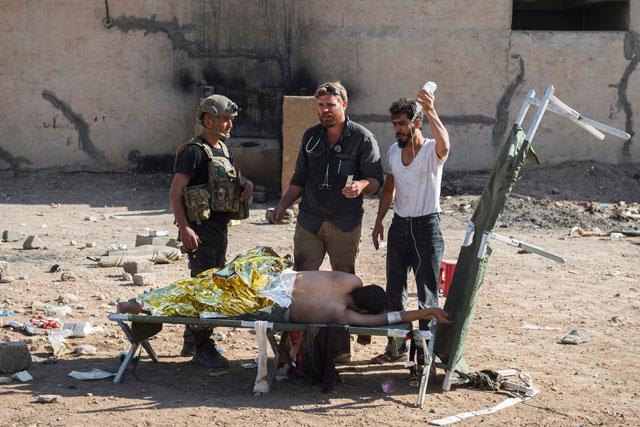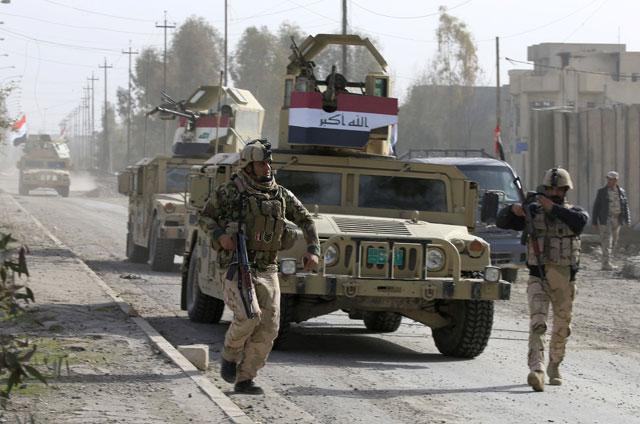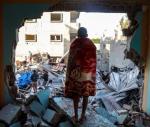You are here
Air strike hits Mosul bridge, disrupting Daesh supply lines
By AP - Nov 23,2016 - Last updated at Nov 23,2016

Displaced Iraqis who fled Mosul due to the ongoing fighting between Iraqi forces and extremists of the Daesh terror group receive food and drinks from volunteers of a NGO as they wait to be taken to a camp for displaced people, on Wednesday, in Bartalla, east of Mosul (AFP photo)
MOSUL — An air strike by the US-led coalition on Wednesday “disabled” the fourth bridge on the Tigris River in Mosul, leaving the northern Iraqi city with a single functioning bridge and further disrupting the Daesh terror group’s supply lines amid the government offensive against the extremists.
The extremist group’s media arm, the Aamaq news agency, and a top Iraqi commander in Mosul reported the air strike, which took place before dawn. It was the second air strike to target a Mosul bridge this week and the fourth since shortly before the October 17 start of the Iraqi government’s campaign to retake the city from Daesh.
The air strike was followed by intense fighting in an eastern Mosul neighbourhood where Iraq’s special forces are slowly advancing toward the city centre, hampered by suicide car bombings, sniper’s fire and concerns over the safety of civilians still living inside the city.
Mosul had five bridges over the Tigris until shortly before the start of the campaign. Targeting the bridges appears designed to disrupt Daesh supply lines in Mosul, which is sliced in half by the river. Most of the fighting in Mosul is taking place in the eastern part of the city — east of the Tigris — where Iraqi special forces are slowly moving toward the city centre in the face of stiff Daesh resistance.
The destruction of the bridges means that the Iraqi military and its allies — the Kurdish peshmerga forces and Sunni tribesmen — would have to use military pontoon bridges to cross the river when they arrive at the banks of the river.
Brig. Gen. Haider Fadhil of the Iraqi special forces told The Associated Press that his men were slowly pushing back Daesh militants in the densely populated Mosul neighbourhood of Zohour. He said their progress was hampered by Daesh suicide car bombs, several of which were targeted by coalition aircraft before they reached their intended targets. His men were in control of about half the neighbourhood by Wednesday afternoon, he said.
Mortars, artillery and automatic fire were used in the fighting, which prompted dozens of families to flee their homes to the safety of centres set up for displaced civilians away from front-line neighbourhoods, according to an AP team in Mosul. Unmanned aircraft flew overhead and deep booms from air strikes could be heard. Plumes of smoke rose above the battlefield.
By the afternoon, reinforcement of about 100 heavily armed special forces troops arrived and moved directly to the battlefield.
The displaced families arrived to safety carrying plastic bags filled with personal belongings. They had walked from neighbourhoods closer to the centre of the city. One family arrived on a donkey-drawn cart.
Across the street from where the displaced civilians were being loaded onto trucks, a wounded soldier was brought for treatment. Later, the body of a dead soldier arrived in a black Humvee. It was wrapped in a blanket bearing the image of Imam Hussein, one of the most revered saints to Shiite Muslims. Later, five members of the same family were rushed into the medical aid station. All five — a man and four children — were bleeding from shrapnel wounds when a mortar hit their home in the Tahrir neighbourhood.
Dozens of other displaced civilians also descended on the aid station but were turned away by troops, who said they had intelligence that Daesh was planning to send suicide bombers masquerading as displaced families there.
The progress of the Mosul campaign has been slow as the Iraqis and the US-led coalition avoid using overwhelming power against Daesh because of the presence inside the city of some 1 million civilians.
On Tuesday, a UN spokesman said the number of displaced people fleeing the military operation in Mosul has risen to over 68,000.
Stephane Dujarric said 8,300 Iraqis had been displaced from the city and outlying districts over the past four days, citing figures from the UN-linked International Organisation for Migration.
The majority of the displaced — 59,200 — came from the districts surrounding Mosul and the rest from inside the city, he said.
In Turkey, Prime Minister Binali Yildirim and the prime minister of Iraq’s autonomous Kurdish region, Nechirvan Barzani, met on Wednesday to discuss the operation to oust Daesh militants from Mosul, according to an emailed statement.
Ankara and the Iraqi Kurds have forged strong economic bonds. Barzani later travelled to Istanbul where he met with President Recep Tayyip Erdogan.
Related Articles
BARTELLA, Iraq — Iraqi special forces battling to clear the Daesh terror group from eastern Mosul have killed nearly 1,000 militants, but fi
MOSUL — Layers of hastily erected barricades built from rubble and twisted metal trace Mosul's eastern frontline where Iraqi forces and Daes
ERBIL /BAGHDAD — Iraqi forces pushed Daesh militants back further in Mosul on Tuesday in a renewed effort to seize the northern city and dea



















